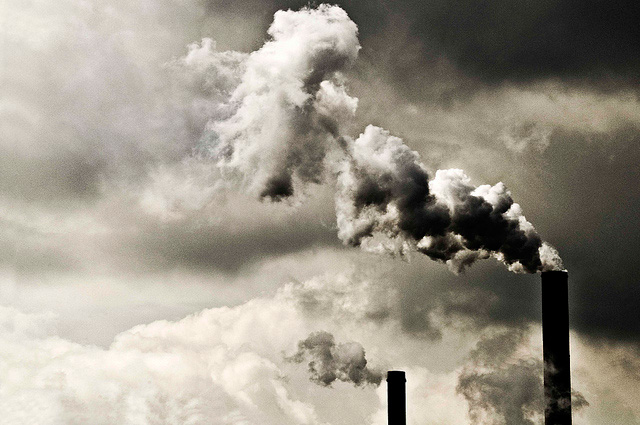
Support justice-driven, accurate and transparent news — make a quick donation to Truthout today!
Millions of deaths around the world are preventable every year without any additional spending on research for treatment. And the cause has nothing to do with gun violence or war.
According to a new report from the World Health Organization (WHO), approximately 12.6 million people die globally each year as a result of environmental exposures. More than 8 million of those deaths are caused by exposures to non-infectious or parasitic forms of environmental risks, including air pollution and secondhand smoke.
Low- and middle-income countries in Southeast Asia, the Western Pacific and Africa account for most of those deaths. But some of the environmental risk is coming from the United States, which continues to export coal to poor countries. Why the urgency? There are steps we can take immediately to stop some of the premature deaths.
First, using products that significantly reduce air pollution exposures will help. More than 3 billion people around the world still cook and heat their homes using open fires that burn solid waste such as wood, crop wastes, animal dung and coal for fuel.
When that fuel is burned, it releases small particulates — more commonly known as soot — that contribute to premature deaths, especially in children and older people, from asthma, pneumonia, heart disease, chronic obstructive pulmonary disease (COPD) and lung cancer.
One step toward reduction in deaths is to stop supplying poor countries with products that cause environmental harms. At the top of this list are tobacco products, which not only kill up to 50 percent of those who smoke them, but these products contribute to another 600,000 deaths per year from secondhand smoke, according to the WHO.
Countries around the world exported more than $24 billion worth of tobacco products in 2014. The United States shipped more than $500 million in those products to foreign countries. But that number does not reflect the actual level of US company involvement in tobacco sales outside the United States. Instead of exporting tobacco products, over the past 20 years, major US tobacco companies have expanded overseas operations. Regardless of where they are produced, tobacco products are toxic to users and the environment.
US coal exports also contribute to deaths. With demand for coal rapidly decreasing in the United States, coal companies are pushing aggressively to open opportunities for coal exports to countries with growing electricity demands like China and India. Coal emissions also contribute to global warming.
When coal is burned — most typically in coal-fired power plants — it releases particulate matter, sulfur dioxide and nitrogen oxides (the precursors of smog). Long-term exposure to these chemicals leads to multiple life-threatening illnesses, including respiratory and cardiovascular diseases and lung cancer.
Coal power plants also emit hazardous metals and substances such as mercury, persistent organic pollutants (POPs) and polycyclic aromatic chemicals (PAHs). Mercury from coal power plants can lead to impairment of cognitive development in children and harm to a fetus during pregnancy.
To be sure, many poor countries suffer from energy poverty, and cheap coal helps to fill that gap. But in the face of the harms and even deaths caused, many consider coal to be an unviable solution.
The contribution to greenhouse gas emissions also cannot be ignored. Indeed, along with the health threats posed by inhalation or ingestion of the pollutants emitted by burning coal, poor countries will suffer most from the environmental consequences of climate change, including both drought and flooding.
These environmental harms are magnified by the concentration of people in poor countries living in megacities. Beijing, Delhi and Lagos are home to approximately 42 million inhabitants, nearly 17 percent of the earth’s population. In each of these cities, particulate matter caused by exhaust, industrial plants and generators suffuses the air, hindering both health and quality of life.
But that also offers an opportunity for a huge positive impact through interventions to stop easily preventable deaths caused by environmental contaminations.
The focus of the global health community over recent years has primarily been on protecting against infectious and parasitic diseases. As a result, the rate of deaths from those diseases in the last decade has decreased significantly.
The latest research from WHO provides a roadmap for making similar inroads in fighting preventable deaths caused by noncommunicable environmental risks, and moves the necessary actions from the abstract to the urgent.
A terrifying moment. We appeal for your support.
In the last weeks, we have witnessed an authoritarian assault on communities in Minnesota and across the nation.
The need for truthful, grassroots reporting is urgent at this cataclysmic historical moment. Yet, Trump-aligned billionaires and other allies have taken over many legacy media outlets — the culmination of a decades-long campaign to place control of the narrative into the hands of the political right.
We refuse to let Trump’s blatant propaganda machine go unchecked. Untethered to corporate ownership or advertisers, Truthout remains fearless in our reporting and our determination to use journalism as a tool for justice.
But we need your help just to fund our basic expenses. Over 80 percent of Truthout’s funding comes from small individual donations from our community of readers, and over a third of our total budget is supported by recurring monthly donors.
Truthout has launched a fundraiser, and we have a goal to add 182 new monthly donors in the next 24 hours. Whether you can make a small monthly donation or a larger one-time gift, Truthout only works with your support.